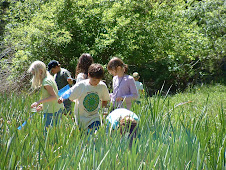In our capital driven society, it is important to put your money where your mouth is. There a few databases to research products to be sure that the things in your home are not harming your health. We cannot leave it up to the FDA to protect us from harmful substances (remember toxic shock syndrome, red dye #5, lead based paint). Many ingredients are not regulated and some have minimum healthy amounts that are allowed to be in our food and other products.
Food: Did you know that you can eliminate up to 90% of the pesticide intake in your diet by avoiding 12 conventionally raised items of produce? Check out the website www.foodnews.org for a shoppers guide that you can easily fit in a wallet. Oh, buy the way, the 12 foods that you have the highest pesticide load (and that you should therefore eat only organic) are, in order of worst to really bad, 1.Peaches 2.Apples 3.Sweet bell peppers 4.Celery 5.nectarines 6.strawberries 7.cherries 8.lettuce 9.grapes (imported) 10.pears 11.spinach 12.potatoes
www.foodnews.org
Cosmetics: Did you know that many of the things in the cosmetics we use are not regulated by the government but are harmful to our bodies and the environment that sustains our lives? This website covers soaps, shampoos, conditioners, lotions, suntan products, etc... Check out this website to see where the products you currently use in your home rank in safety and to see what products are the safest for you and your environment: www.cosmeticdatabase.com
For a shoppers card look here:http://www.thegreenguide.com/doc/122/dirtydozen
Seafood: This is the shoppers guide that started the shoppers guide. Check it out to see what seafoods are safest for you to eat and least impactful on our worlds waters:
www.environmentaldefense.org/documents/1980_pocket_seafood_selector.pdf
Home Cleaning Products: remember grandmas cleaning solutions? Back then they were "thrifty" choices, today they are "green" choices. Cleaning product companies are not required to disclose all their ingredients. Remember, words like "non-toxic", "eco-safe", and "environmentally friendly" are not regulated, meaning there is no legal definition for their use, meaning don’t trust them. Check out the website below for home recipes for cleaning. Hint, its all about white vinegar...
http://www.mothering.com/articles/growing_child/consumerism/good_housecleaning.html
This article gives an overview on the topic:
http://www.grist.org/advice/possessions/2003/03/18/possessions-cleaning/index.html
Well, there you have it. Keep your home free of nasty chemicals and make the world and future a better place by making informed, conscious buying decisions. In many cases it's cheaper too!
Subscribe to:
Post Comments (Atom)










1 comment:
Hey, thanks for linking to our seafood selector in this post! In light of the recent New York Times article on mercury in sushi, I wanted to let you know that we have updated it and it’s a lot easier to use. We’ve also added more fish.
http://EnvironmentalDefense.org/seafood
Also, here is a link to the pocket seafood selector that people can download and then take with them.
http://EnvironmentalDefense.org/documents/1980_pocket_seafood_selector.pdf
Post a Comment